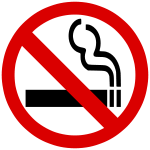- Ban (law)
-
A ban is, generally, any decree that prohibits something.
Bans are formed for the prohibition of activities within a certain political territory. Some see this as a negative act (equating it to a form of censorship or discrimination) and others see it as maintaining the "status quo". Bans in commerce are referred to as embargos.
Contents
Etymology
In current English usage, ban is mostly synonymous with prohibition. Historically, Old English (ge)bann is a derivation from the verb bannan "to summon, command, proclaim" from an earlier Common Germanic *bannan "to command, forbid, banish, curse". The modern sense "to prohibit" is influenced by the cognate Old Norse banna "to curse, to prohibit" and also from Old French ban, ultimately a loan from Old Frankish, meaning "outlawry, banishment".
The Indo-European etymology of the Germanic term is from a root *bha- meaning "to speak". Its original meaning was magical, referring to utterances that carried a power to curse.
Banned political parties
In many countries, political parties may be and are banned. Germany, for instance, has a long history behind its modern practice of banning political parties. The Nazi Party was banned in 1923, non-Nazi parties such as the Communist Party were banned in 1933, the Nazi Party was again banned and the Communist Party un-banned after 1945, and the Communist Party was again banned in 1956 then un-banned in 1968.
Banning marriages
A marriage ban is used to prevent certain categories of people from marrying each other. For much of the 1800s and 1900s there were bans on marriage between people of different races (interracial marriage) in the United States. However, the ban on interracial marriage was overturned by the Supreme Court of the United States in 1957 in the landmark civil rights case Loving vs. Virginia, in which the Court ruled Virginia's miscegenation law an unconstitutional violation of the fundamental right to marriage. Historically, child marriage was common, but is now banned in some countries. There have also been bans enacted on same sex marriage.
Banned persons
The imperial ban was a form of outlawry in the Holy Roman Empire. At different times, it could be declared by the Holy Roman Emperor, by courts like the Vehmgericht or the Reichskammergericht, or by the Reichstag. People under imperial ban lost all their rights and possessions and anyone was allowed to rob, injure or kill them without legal consequences. The imperial ban automatically followed the excommunication of a person, as well as extending to anyone offering help to a person under the imperial ban.
During the apartheid régime in South Africa, the National Party government issued banning orders to individuals seen to be threats to its power—often black politicians or organizations—and acted as suppression orders. Individuals banned by the Suppression of Communism Act could not communicate with more than one person at any time unless at home (thus removing them from partaking in political activities), travel to areas without government approval, or leave the country.
Banning in games and Internet Forums
In Internet forums and online multiplayer games, the host of the game often has the power to ban players who do not follow the rules, or who make little effort to get along with fellow players. When banned, the user is unable to reconnect to the server. In some cases, especially in games which use account systems, the user may create a new account to attempt to bypass the ban system. In this case, the IP address may be banned from connecting.
IP address banning (sometimes called 'blocking' or 'permabanning') is commonplace in internet culture. The "banhammer", "banstick", or "banbomb" is a metaphorical tool used in popular culture. For instance, a moderator or host is sometimes said to "wield the banhammer" against disruptive individuals.
See also
- Censure and Excommunication, which may result in a ban pursuant to religious law
- Cherem, a ban pursuant to Jewish law
- Export restriction
- Homo sacer and the sovereign state of exception
- List of banned books
- List of banned computer and video games
- List of banned films
- List of websites blocked in the People's Republic of China
- Prohibition - usually referring to historical and current laws regulating prohibition of alcohol
- Shunning practiced in the Amish community
- Use of performance-enhancing drugs in sport
- Wikipedia:List of banned users on Wikipedia
References
Further reading
- "Wikipedia:Banning policy". http://en.wikipedia.org/wiki/Wikipedia:Banning_policy. — the banning policy on Wikipedia
Categories:- Punishments
- Human rights
- Apartheid laws in South Africa
- Criminal law
- Internet culture
Wikimedia Foundation. 2010.

